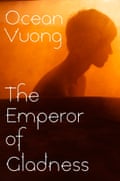Ocean Vuong: Revisiting Family, Identity, and Resilience in American Literature

Ocean Vuong stands as one of the most influential voices in contemporary American literature. Born in Vietnam and raised in Connecticut, Vuong draws on his personal experiences to address themes of family, trauma, survival, and the complexities of immigration. With a unique poetic style and deeply moving narratives, Vuong has captivated readers around the world.
A Literary Voice Forged by Experience
From his stunning debut poetry collection, Night Sky with Exit Wounds, to his acclaimed first novel, On Earth We’re Briefly Gorgeous, Ocean Vuong's writing resonates with authenticity. His latest novel, The Emperor of Gladness, delves even further into the lives of working-class immigrants in America. Vuong doesn’t shy away from the hardships his characters face—he lifts their voices, highlighting the resourcefulness and compassion that help them survive against daunting odds.
As The Guardian details, Vuong’s new book shines a light on the concept of 'circumstantial family.' These are bonds formed not just by blood, but by shared experiences of labor, struggle, and community. The novel’s protagonist, Hai, forges connections with a diverse cast of characters in a Connecticut fast-food restaurant, painting a vivid picture of modern American life.
Exploring Identity and the Power of Community
Central to Vuong's universe are questions of identity—racial, sexual, and familial. He explores what it means to belong, often through the lens of queer and immigrant perspectives. In an era when many voices have been marginalized or suppressed, Vuong’s work is both urgent and healing.
His characters rarely experience dramatic transformations. As noted in a Los Angeles Times review, Vuong’s storytelling honors the reality that, for many, survival itself is an act of quiet heroism. The narratives are filled with moments of beauty and unexpected humor, even as they address themes of loss, addiction, and resilience.
Innovation Rooted in Heritage
Vuong’s own background shapes his work in profound ways. After emigrating to the United States as a child, he and his family faced displacement and poverty. These experiences deeply inform the authenticity of his fiction. His mother’s work in Connecticut nail salons and his own early jobs in restaurants provide not only context but also a wellspring of empathy.
In addition to his writing, Vuong openly discusses the role of Zen Buddhism in his life—a guiding force that helps him navigate fame and personal challenges. He also fosters community among queer writers, offering his home as a refuge and workspace for those in need.
Why Ocean Vuong Matters Today
Ocean Vuong’s writing is more than literature—it is a lifeline for readers searching for understanding and connection. By examining the subtle ties that bind families, chosen or circumstantial, he urges readers to broaden their definitions of kinship.
Vuong's voice is especially vital as American society reckons with issues of identity, migration, and belonging. He not only reflects on the past and present, but also inspires hope for a future where every story matters.
For further insight into Vuong’s life and the impact of his latest novel, explore:
- “Buddhism and Björk help me handle fame”: The Guardian interview with Ocean Vuong
- ‘The Emperor of Gladness’ Review: Despair Shrouds Ocean Vuong’s Novel – Los Angeles Times
- NYTimes: Ocean Vuong, The Emperor of Gladness
Conclusion
Ocean Vuong continues to shape the literary landscape by telling stories that challenge, uplift, and transform. His commitment to exploring the realities and complexities of modern American life ensures his legacy will endure for generations to come. If you haven’t yet experienced Ocean Vuong’s work, now is the perfect time to discover one of literature’s most compassionate and compelling voices.